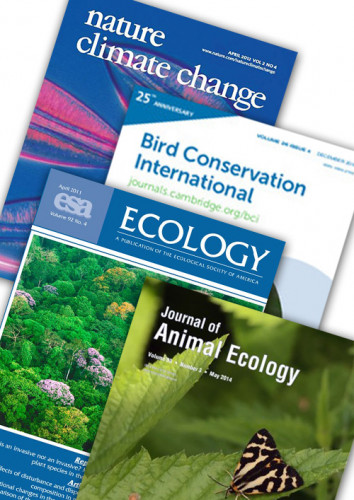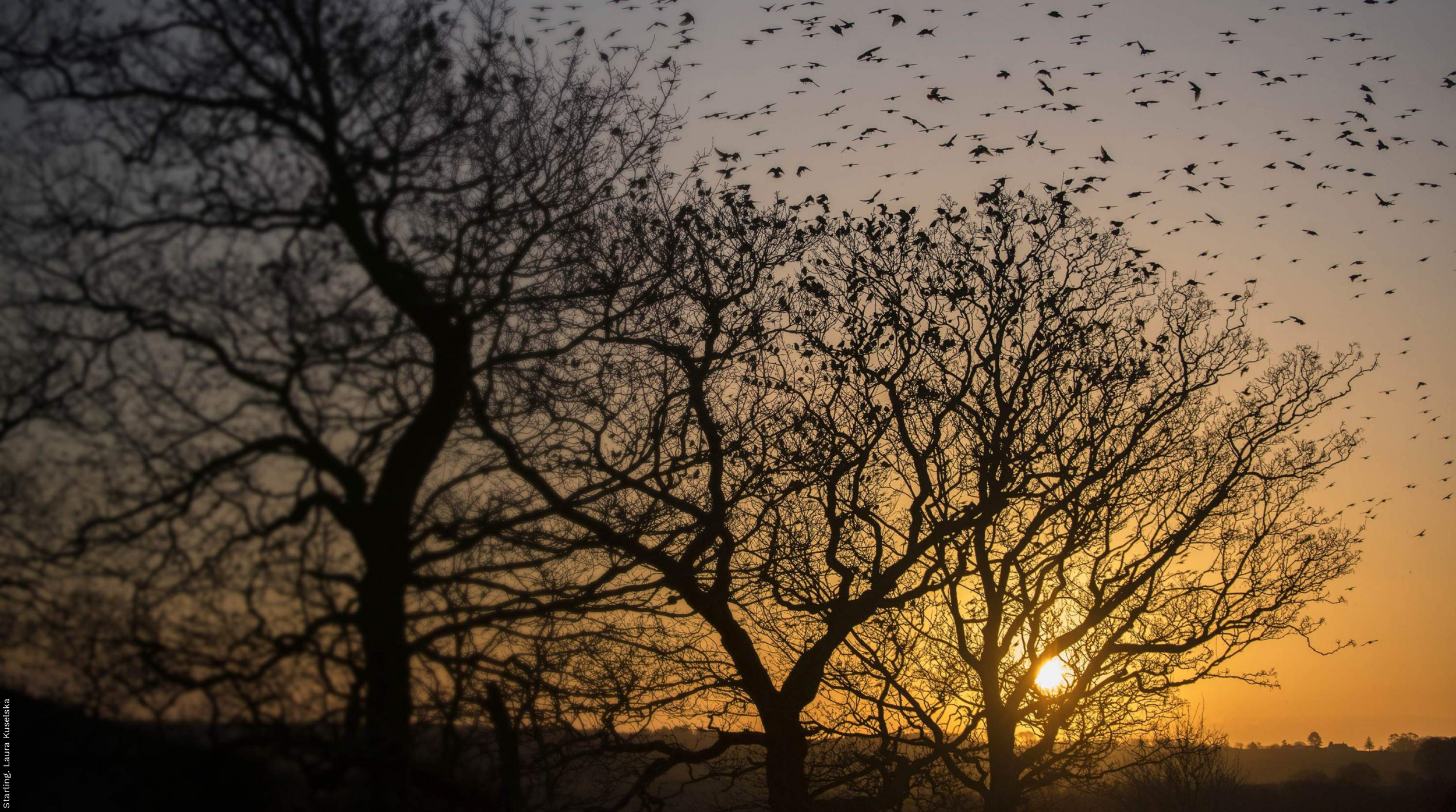Peer-reviewed papers

It is BTO’s policy to make public the results of our research. Our aim is to publish as much as possible of our work in the peer reviewed scientific literature. Many results are also published in our BTO Research Report series.
2023.
Multi-scale habitat selection throughout the annual cycle of a long-distance avian migrant.
Ecological Indicators
156
Link to Article (DOI: 10.1016/j.ecolind.2023.111099)
2023.
Spatially targeted nature-based solutions can mitigate climate change and nature loss but require a systems approach.
One Earth
6
: 1 350-1 374
Link to Article (DOI: 10.1016/j.oneear.2023.09.005)
2023.
Avoidance of offshore wind farms by Sandwich Terns in the North Sea increases with turbine density.
Ornithological Applications
Link to Article (DOI: 10.1093/ornithapp/duad055)
2023.
Combining remote sensing and tracking data to quantify species’ cumulative exposure to anthropogenic change.
Global Change Biology
Link to Article (DOI: 10.1111/gcb.16974)
2023.
A demonstration of the value of recapture data for informing moult phenology models for species with imperfect moult data..
Ostrich
Link to Article (DOI: 10.2989/00306525.2023.2248396)
2023.
The status of the UK breeding European Turtle Dove Streptopelia turtur population in 2021.
Bird Study
Link to Article (DOI: 10.1080/00063657.2023.2256511)
2023.
A crowded ocean: the need for demographic and movement data in seabird conservation.
Ocean and Coastal Management
244
Link to Article (DOI: 10.1016/j.ocecoaman.2023.106833)
2023.
Lasso Penalisation identifies consistent trends over time in landscape and climate factors influencing the wintering distribution of the Eurasian Curlew (Numenius arquata).
Ecological Informatics
Link to Article (DOI: 10.1016/j.ecoinf.2023.102244)
2023.
Local colonisations and extinctions of European birds are poorly explained by changes in climate suitability.
Nature Communications
14
Link to Article (DOI: 10.1038/s41467-023-39093-1)
2023.
Global assessment of marine plastic exposure risk for oceanic birds.
Nature Communications
14
Link to Article (DOI: 10.1038/s41467-023-38900-z)
2023.
Seeing the wood for the trees, irregular silviculture supports bat populations in conifer plantations.
Forest Ecology and Management
Link to Article (DOI: 10.1016/j.foreco.2023.121214)
2023.
Spring arrival of the Common Cuckoo at breeding grounds is strongly determined by environmental conditions in tropical Africa.
Proceedings of the Royal Society B
290
View Abstract
Link to Article (DOI: 10.1098/rspb.2023.0580)
2023.
The phenology and clutch size of UK Blue Tits does not differ with woodland composition.
Ibis
Link to Article (DOI: 10.1111/ibi.13248)
2023.
Changes in breeding wader populations of the Uist machair and adjacent habitats between 1983 and 2022.
Scottish Birds
43 (part 2)
: 132-140
2023.
Reduced breeding success in Great Black-backed Gulls Larus marinus due to harness-mounted GPS device.
Ibis
Link to Article (DOI: 10.1111/ibi.13247)
2023.
Sunning in Yellow Bishops Euplectes capensis.
Ostrich
94 (part 1)
View Abstract
Link to Article (DOI: 10.2989/00306525.2023.2216375)
2023.
Ecological barriers mediate spatio-temporal shifts of bird communities at a continental scale.
PNAS
View Abstract
Link to Article (DOI: 10.1073/pnas.2213330120)
2023.
Drivers of the changing abundance of European birds at two spatial scales.
Proc. Roy. Soc. B
View Abstract
Link to Article (DOI: 10.1098/rstb.2022.0198)
2023.
Temporal avoidance as a means of reducing competition between sympatric species.
Royal Society Open Science
View Abstract
Link to Article (DOI: 10.1098/rsos.230521)
2023.
Trends in butterfly populations in UK gardens - new evidence from citizen science monitoring.
Insect Conservation and Diversity
View Abstract
Link to Article (DOI: 10.1111/icad.12645)
2023.
Behavioral responses to offshore windfarms during migration of a declining shorebird species revealed by GPS-telemetry.
Journal of Environmental Management
342
View Abstract
Link to Article (DOI: 10.1016/j.jenvman.2023.118131)
2023.
Landscape fires disproportionally affect areas of conservation priority but only under low moisture conditions.
Science of The Total Environment
884
Link to Article (DOI: 10.1016/j.scitotenv.2023.163849)
2023.
Farmland practices are driving bird population decline across Europe.
PNAS
View Abstract
Link to Article (DOI: 10.1073/pnas.2216573120)
2023.
Eco-evolutionary drivers of avian migratory connectivity.
Ecology Letters
Link to Article (DOI: 10.1111/ele.14223)
2023.
Daily, seasonal and annual variation in area use of Lesser Black-backed Gulls (Larus fuscus) related to offshore renewable developments.
Bird Study
70
: 13-24
Link to Article (DOI: 10.1080/00063657.2023.2190080)
2023.
How important is it to standardise the measured mass of shorebirds weighed at varying intervals after capture?.
Wader Study
130 (part 1)
Link to Article (DOI: 10.18194/ws.00297)
2023.
Monitoring five decades of change in the UK’s rarest breeding birds through citizen science: the Rare Breeding Birds Panel.
British Wildlife
35
: 335-345
2023.
The Rare Breeding Birds Panel: five decades of monitoring the UK’s rare breeding birds.
British Birds
116
: 191-209
2023.
Highly pathogenic avian influenza in Great Britain: evaluation and future actions.
Defra Science Advisory Council Report
Defra
View Abstract
2023.
Social media and deep learning reveal specific cultural preferences for biodiversity.
People and Nature
5
: 981-998
Link to Article (DOI: 10.1002/pan3.10466)
2023.
A niche-based approach for evaluating the mechanisms of community stability in butterfly communities across three countries.
Global Change Biology
29
: 3 271-3 284
View Abstract
Link to Article (DOI: 10.1111/gcb.16684)
2023.
Aerial insect biomass, but not phenological mismatch, is associated with chick survival of an insectivorous bird.
Ibis
Link to Article (DOI: https://doi.org/10.1111/ibi.13190)
2023.
Limited effectiveness of actions intended to achieve a voluntary transition from the use of lead to non-lead shotgun ammunition for hunting in Britain.
Conservation Evidence Journal
20
: 1-7
Link to Article (DOI: 10.52201/CEJ20/OQWU5273)
2023.
The conservation of Afro-Palaearctic migrants: what we are learning and what we need to know.
Ibis
View Abstract
Link to Article (DOI: 10.1111/ibi.13171)
2023.
Collation of a century of soil invertebrate abundance data suggests long-term declines in earthworms but not tipulids.
PLOS ONE
Link to Article (DOI: 10.1371/journal.pone.0282069)
2023.
A review of the impacts of air pollution on terrestrial birds.
Science of The Total Environment
873
Link to Article (DOI: 10.1016/j.scitotenv.2023.162136)
2023.
Using species-habitat models to predict bird counts from urban development plans.
Landscape and Urban Planning
230
Link to Article (DOI: 10.1016/j.landurbplan.2022.104629)
2023.
Evolution of female song and duetting in the Chaffinch (Fringilla) species complex.
Journal of Avian Biology
Link to Article (DOI: https://doi.org/10.1111/jav.03069)
2023.
Inconsistent relationships between area, heterogeneity and plant species richness in temperate farmed landscapes.
Oikos
Link to Article (DOI: 10.1111/oik.09720)
2023.
Declines in invertebrates and birds – could they be linked by climate change?.
Bird Study
View Abstract
Link to Article (DOI: 10.1080/00063657.2022.2157373)
2023.
Reversing declines in farmland birds: how much agri-environment provision is needed at farm and landscapes scales?.
Journal of Applied Ecology
Link to Article (DOI: 10.1111/1365-2664.14338)
2022.
Nest survival of threatened Eurasian Curlew (Numenius arquata) breeding at low densities across a human-modified landscape.
Ibis
Link to Article (DOI: 10.1111/ibi.13180)
2022.
Using satellite data to assess spatial drivers of bird diversity.
Remote Sensing in Ecology and Conservation
Link to Article (DOI: 10.1002/rse2.322)
2022.
Development of a prototype early warning system for avian influenza in the EU based on risk-mapping.
EFSA Supporting Publications
19 (part 12)
European Food Safety Agency
Link to Article (DOI: 10.2903/sp.efsa.2022.EN-7762)
2022.
The Yellow-browed Warbler (Phylloscopus inornatus) as a model to understand the mechanisms of vagrancy and its potential significance for the evolution of new migratory routes.
Movement Ecology
View Abstract
Link to Article (DOI: 10.1186/s40462-022-00345-2)
2022.
Curves for Curlew: Identifying Curlew breeding status from GPS tracking data.
Ecology and Evolution
12
Link to Article (DOI: 10.1002/ece3.9509)
2022.
High pathogenicity avian influenza: Targeted active surveillance of wild birds to enable early detection of emerging disease threats.
Epidemiology & Infection
View Abstract
Link to Article (DOI: 10.1017/S0950268822001856)
2022.
Rare and declining bird species benefit most from designating protected areas for conservation in the UK.
Nature Ecology & Evolution
Link to Article (DOI: 10.1038/s41559-022-01927-4)
2022.
Benefits of protected area networks for breeding bird populations and communities.
Animal Conservation
Link to Article (DOI: 10.1111/acv.12832)
2022.
Acute impacts from Teflon harnesses used to fit bio-logging devices to Black-legged Kittiwake Rissa tridactyla.
Ringing & Migration
Link to Article (DOI: 10.1080/03078698.2022.2151065)



Share this page